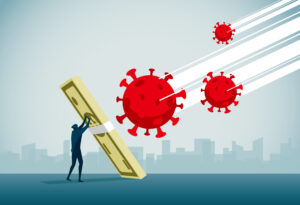Coronavirus Crisis Chops Down Enhanced Damages For Copyright Infringer
Court draws distinction between what would serve as a 'strong deterrent' and what 'could be catastrophic.'

(Image via Getty)
The COVID-19 pandemic has not only served as an underlying cause for litigating disputes, including those filed against insurers for failure to pay out on submitted claims, it is now acting as the foundation to diminish damages awarded to prevailing parties. The extent to which coronavirus can play a role in abating the gravity of a damages calculation recently played out with a federal judge situated in the Southern District of Florida.
The case was initiated by Zuffa, LLC, which does business as Ultimate Fighting Championship (UFC) and sought relief from a restaurant that allegedly aired a broadcast of the UFC fights on July 6, 2019, paying only a reduced pay-per-view price under the guise that the event was being displayed at a residential address. The complaint claimed that the restaurant knowingly exhibited the broadcast without authorization and for the purpose of commercial advantage by paying the reduced residential fee despite having a clear understanding that it was operating as a commercial entity with numerous individuals in attendance.

The Business Case For AI At Your Law Firm

No defense was presented in the case and a clerk’s default was entered prior to the UFC moving for default judgment. The default judgment motion requested $40,000 in damages for unauthorized interception of the transmission, $40,000 in damages for copyright infringement, $612 in attorney’s fees and $800 in costs. The majority of the monies requested for unauthorized interception and copyright infringement was made up of enhanced damages.
The court recognized that the violations of the Communications Act and of plaintiff’s copyright were willful, which allowed it to award enhanced damages given the facts of the case. However, the only factor that the court used to assess enhanced damages was the determination that the defendant advertised for the event by posting about the broadcast on social media.
The court then acknowledged that while enhanced damages should generally be substantial enough to discourage future lawless conduct, it should not be so severe so as to seriously impair the viability of the defendant’s business. That is where the conversation turned to the coronavirus pandemic, with a ruling that could be cited to by others in an effort to reduce enhanced damages as long as the pandemic remains of grave concern across the United States and particularly in South Florida.
“It is impossible to ignore the impact of the Covid-19 pandemic in applying this standard,” the court stated in its ruling. “Restaurants remain in significant economic distress, with restrictions on indoor dining capacity still in effect. An award that might otherwise amount to a strong deterrent could be catastrophic.”
Sponsored

Early Adopters Of Legal AI Gaining Competitive Edge In Marketplace

Legal AI: 3 Steps Law Firms Should Take Now

The Business Case For AI At Your Law Firm


Is The Future Of Law Distributed? Lessons From The Tech Adoption Curve
Instead of awarding the plaintiff with its requested $60,000 in enhanced damages, the court awarded a mere $1,000 in that category of relief. That presents a major gap between the request and what was actually awarded by the court, and a majority of the blame for the delta could be placed squarely on COVID-19.
Darren Heitner is the founder of Heitner Legal. He is the author of How to Play the Game: What Every Sports Attorney Needs to Know, published by the American Bar Association, and is an adjunct professor at the University of Florida Levin College of Law. You can reach him by email at heitner@gmail.com and follow him on Twitter at @DarrenHeitner.
Sponsored

Is The Future Of Law Distributed? Lessons From The Tech Adoption Curve








